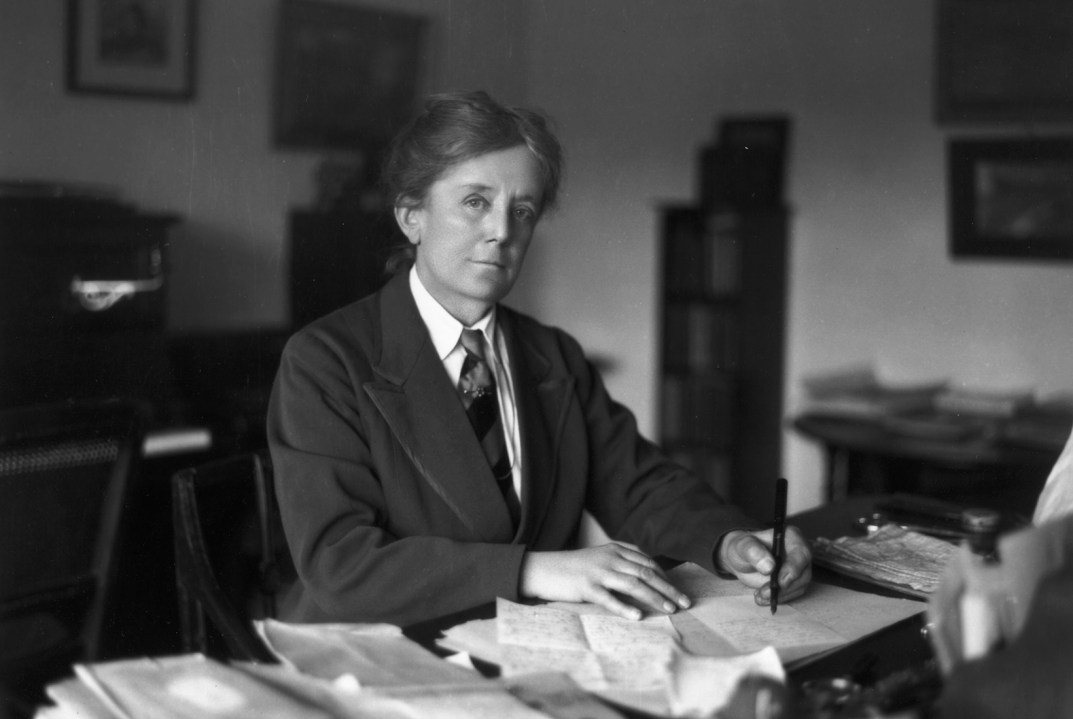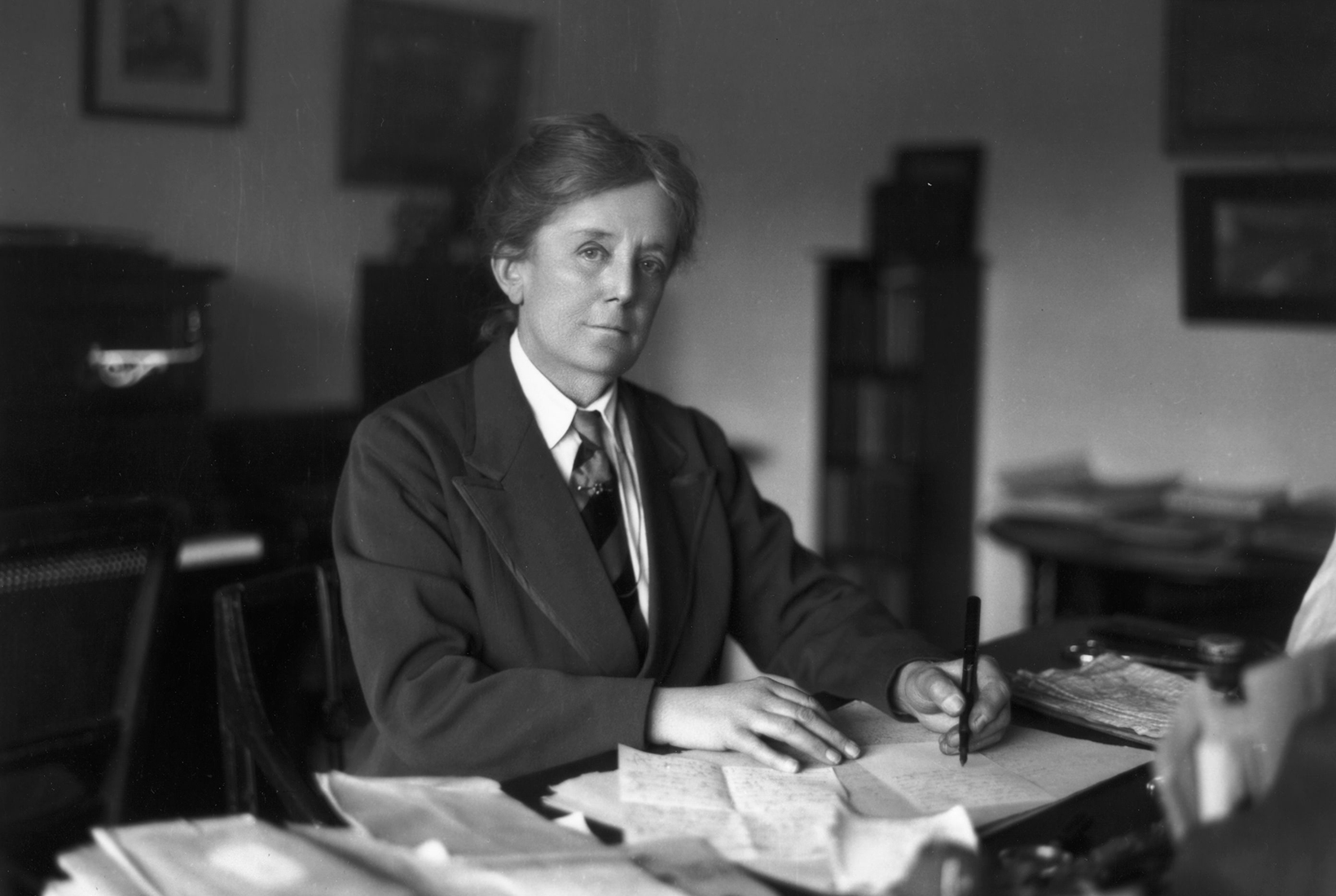I’m reminded of an old Irish joke. A tourist approaches a local for directions to Dublin. The local, after much teeth-sucking and head-scratching, eventually replies: ‘Well, I wouldn’t start from here…’.
The news that, 75 years after her death, English composer Ethel Smyth has won a Grammy Award for her last large-scale work The Prison is as excellent as it is unexpected. But it’s also frustrating because, well, if I were setting out into Smyth for the first time, I really wouldn’t start from there.
A ‘symphony’ for soprano, bass–baritone, chorus and orchestra, The Prison was the 72-year-old Smyth’s final homage to American philosopher and poet Henry Brewster: librettist, friend, lover and cheerleader for the composer for more than 20 years. In a life punctuated by short, intense passions — relationships (with men and women, both platonic and romantic) that burned hot and then flamed out — he was a rare fixed point.
Smyth was the only English composer of her generation achieving real international status in opera
Whatever his qualities as a man, as a writer Brewster was a dubious quantity. The Prison — a dialogue between a (metaphorical) prisoner and his soul — was much mocked by Leonard Woolf for its pretentious cod-philosophising. The text is a leaden anchor for Smyth’s setting, weighed down by its awkward abstraction on the one hand and by the ghost of Elgar’s The Dream of Gerontius on the other. A characteristically barbed New Statesman review of the premiere called it ‘… a brave attempt at mediocrity… without attaining that bottomness which is completely diverting’.
This recording however — the first ever — is sumptuous. James Blachly and his Experiential Orchestra and Chorus make no apology for the musical melodrama, if anything exaggerating Smyth’s peaks and troughs with transcendent smears of harp and big, martial brass, transforming erratic shifts of mood and material into spontaneity. It’s all a Hollywood foil to Dashon Burton’s Prisoner — a Daniel Day-Lewis of a performance, strenuously, meticulously human and ravishingly sung.
Smyth — a woman of battered tweeds and sensible shoes, plenty of dogs and tennis and good dinners — was very much a creature of earth. Much better to meet her on her own turf. Not for nothing did Virginia Woolf praise the ‘Long, rolling breakers’ and the ‘easy stride’ of her prose. Nine volumes of memoir (handily condensed by Ronald Crichton into a single book of highlights) offer a humorous and often startling entrée into a life where Brahms, Queen Victoria, Emmeline Pankhurst, the Kaiser and George Bernard Shaw all play supporting roles.
We learn that the young Smyth was briefly engaged to Oscar Wilde’s brother, William, but that she lost the ring some years later ‘…while separating two dogs who were fighting in deep snow’; that she set off into the Apennines with nothing more than a change of clothes and a revolver, and, as a teenager, travelled to Leipzig to study music against her father’s wishes with scarcely more to her name.
We see her wrestle with her feelings towards the many women in her life, and even follow her into Holloway Prison, where she found herself incarcerated for two months following an act of suffragette protest. It’s the episode that gives us Thomas Beecham’s famous description: ‘I arrived in the main courtyard… to find the noble company of martyrs marching round it and singing lustily their war-chant while the composer, beaming approbation from an overlooking upper window, beat time in almost Bacchic frenzy with a toothbrush.’
I suspect, for most of us, that’s how Smyth exists in our consciousness: an indomitable Edwardian eccentric, forever wielding her toothbrush-baton — a musician we’ve heard of, but whose music we’ve barely heard. But it’s a cartoon that misses her very real significance in an England still searching for musical identity. We mutter something about Elgar, then pick up the story enthusiastically again in 1945 with the triumphant reopening of Sadler’s Wells with Peter Grimes, but forget that Smyth’s The Wreckers was the final production at Sadler’s Wells before it closed in 1939. Smyth wasn’t just the only woman, she was the only English composer of her generation achieving real international status in opera.
Even if The Wreckers wasn’t any good, its link to Grimes alone should justify Smyth’s place in the repertoire. But it really is good: a surging, big-hearted B-movie of an opera that gives the lie to images of parochial Little England both in its music (just listen to the lovers’ gloriously Wagnerian Act II, the chilling sea-cave choruses, or to Avis’s sensuous music — Carmen with a Cornish accent) and its complete refusal to operate within a conventional moral framework.
And The Wreckers is no one-off. The intimate, revealing songs, the String Quartet with a decade dividing its first and last movements, the ebullient Mass in D (in which, according to one Archbishop, God is ‘not implored but commanded to have mercy’) — all add up to a composer who is very far from a novelty. But with a major new UK production opening next summer — the first in our lifetime — The Wreckers is absolutely the right place to start.







Comments